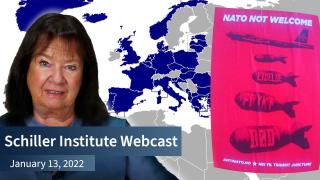In reviewing the ongoing series of discussions this week between Russia, the U.S. and NATO -- which she said so far "looks terrible" -- Helga Zepp-LaRouche returned to what she described as the two alternative approaches to relations between nations.
The Versailles Treaty at the end of World War I has in common with the posture of the U.S. and NATO today the view that the victors in war can dictate the terms of peace, as a unipolar force. This blatant assertion of world dominance ignores the legitimate wishes of other nations, and insists on their subordination to the unipolar power. This typifies the "arrogance of power" of today's globalist war hawks, who claim the U.S. "won the Cold War", and therefore has the right to be the dominant world power.
In contrast, the Peace of Westphalia, which ended the Thirty Years War in 1648, was based on the idea that recognizing the "interests of others" is the key to a durable peace. The outright rejection thus far by U.S. negotiators of the legitimacy of President Putin's security concerns will not be accepted by Russia. While it is better to talk than not, she said, the overall posture of the U.S. in these talks has "lowered the nuclear threshold", making the use of nuclear weapons more likely should war break out.
NATO, which should have been dissolved at the end of the Cold War, must be replaced, especially since its present policy course leads to a war in which its members in Europe will be destroyed. Belonging to a security alliance which would lead to war doesn't make sense. Demonizing Putin and attacking the Belt-and-Road Initiative when the western financial system is crashing also does not make sense. She concluded by calling on our viewers to participate in the emergency Schiller Institute's online seminar on January 17, on the theme, "Stop the Murder of Afghanistan."






